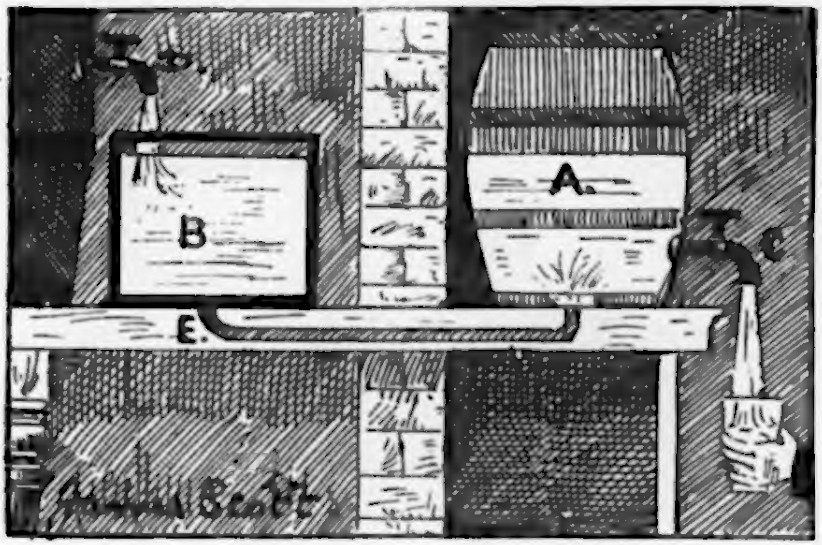Kinship
That is a simple rule, and easy to remember. When I, a thoughtful and unblessed Presbyterian, examine the Koran, I know that beyond any question every Mohammedan is insane; not in all things, but in religious matters. When a thoughtful and unblessed Mohammedan examines the Westminster Catechism, he knows that beyond any question I am spiritually insane. I cannot prove to him that he is insane, because you never can prove anything to a lunatic — for that is a part of his insanity and the evidence of it. He cannot prove to me that I am insane, for my mind has the same defect that afflicts his. All Democrats are insane, but not one of them knows it; none but the Republicans and Mugwumps know it. All the Republicans are insane, but only the Democrats and Mugwumps can perceive it. The rule is perfect: in all matters of opinion our adversaries are insane.
— Mark Twain, Christian Science, 1907
Amalgamation
Putting mercury in contact with an aluminum plate has some surprising consequences (2:05).
Endless Love
Joe invents a time machine. He travels back in time and meets Emily, and they have a child, Bill. Bill grows up, meets Carol, and has a child, Joe. Joe grows up and invents a time machine, and so on.
Joe and Bill are each the other’s father and son, and each man is his own grandfather.
From Dave Morice’s Alphabet Avenue, 1997. See “Proof That a Man Can Be His Own Grandfather” and Oedipus Wrecked. Robert Heinlein’s 1959 story “‘–All You Zombies–‘” is even more confusing.
Regrets
When Charles Dickens was editing Household Words, a young writer named Laman Blanchard submitted an interminable poem titled “Orient Pearls at Random Strung.”
Dickens mailed it back with a note: “Dear Blanchard, too much string — Yours, C.D.”
A Sharp
Antique dealer Leopoldo Franciolini (1844–1920) was so prolific in creating fraudulent musical instruments that scholars are still trying to sort out the confusion he left behind. The modern stewards of Frederick Stearns’ collection write:
In this case, we have an Alto Clarinet in F. … It is a composite instrument with four sections: two are leather-covered maple, … the barrel appears to have been purloined from a bass clarinet … the bell from an oboe. The mouthpiece appears to be re-purposed from a bass clarinet. … The simultaneous crudeness and creativity demonstrated in [Franciolini’s] catalogue is greatly entertaining. More troubling, however, is the shadow cast upon the flawed judgment of Frederick Stearns in his last years of collecting.
The catalog description of a harpsichord in the Stearns collection reads, “One could say that it is the only surviving instrument ever crafted by the maker Rigunini, however, given that not a single person by the name of Rigunini ever seems to have drawn breath, we might assume that Franciolini invented the name and forged the date.”
The Great Michigan Pizza Funeral

When the FDA ordered Ilario Fabbrini to recall 29,188 frozen cheese and mushroom pizzas in 1973, fearing a botulism outbreak, the Michigan pizza magnate went them one better: He buried the pies ceremonially in an 18-foot hole before a crowd of hundreds, including Michigan governor William Milliken.
“I admire your spunk and your spirit,” Milliken told him. “You are an example for businessmen all over the country who are facing tough problems. You are fighting back and I’m sure you will succeed.”
Fabbrini had hoped to make a virtue of necessity, giving up the pizzas but gaining at least some publicity and goodwill in the process. The recall was the largest of its kind to date in American history.
Unfortunately the FDA later ruled out botulism, which meant that the whole escapade had been needless.
Fabbrini sued his suppliers and eventually won the case, but Papa Fabbrini Pizzas went out of business in the early 1980s.
Express
The Rev. John Dobson’s 1815 Elements of Geometry contains no stops except for a period at the end of each paragraph.
In writing a sketch of Dobson’s life, Augustus De Morgan omitted the punctuation.
“He would not stop for any one,” he wrote. “Why should I stop for him?”
In a Word
armisonous
adj. resounding with arms
The Battle of the Somme began with a weeklong artillery bombardment in which more than a million shells were fired at the German lines. A soldier describes the first day:
The sound was different, not only in magnitude but in quality, from anything known to me. It was not a succession of explosions or a continuous roar; I at least, never heard either a gun or a bursting shell. It was not a noise; it was a symphony. And it did not move. It hung over us. It seemed as though the air were full of vast and agonized passion, bursting now with groans and sighs, now into shrill screaming and pitiful whimpering … And the supernatural tumult did not pass in this direction or in that. It did not begin, intensify, decline and end. It was poised in the air, a stationary panorama of sound, a condition of the atmosphere, not the creation of man.
At the Battle of Messines in June 1917, 19 mines comprising 600 tonnes of explosives were detonated, producing the largest man-made explosions in history to that date. One witness recalled that the “earth rocked as though a giant hand had roughly shaken it.”
(John Ellis, Eye-Deep in Hell, 1989, via Joy Damousi et al., eds., Museums, History and the Intimate Experience of the Great War, 2020.)
“A Whisky Puzzle”

In 1895 a London shopkeeper attracted customers with a glass cask of whiskey — they were puzzled to find that no matter how much liquid they drew off, the level in the cask never dropped. The container could be viewed from any angle, and it stood well away from the wall. How was this possible?
A hidden pipe connected the bottom of the cask to a tank in another room. When a customer drew a glass of whisky, a confederate there would open a tap to replenish tank B, and the liquid, seeking its own level, would maintain the same height in the cask.
(James Scott, “Shopkeepers’ Advertising Novelties,” Strand, November 1895. See Desert Downpour.)

